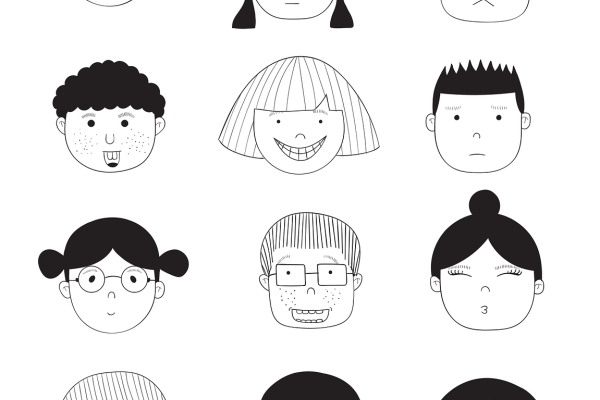HEXACO (original) (raw)

Character matters! Personality differences are often summed up based on five broad dimensions, which are called the Big Five: neuroticism, extraversion, agreeableness, conscientiousness, and openness to experience. But in the early 2000s psychologists discovered evidence of a sixth personality factor, which led to a new model of personality called HEXACO. The distinctly new factor is called “honesty-humility,” and it is a component of moral character. (The other components of HEXACO are all variations of the Big Five.)
Contents

HEXACO retains much of the Big Five, but redefines some of the personality factors and adds a sixth. Today, both the five-factor model and HEXACO are used by different teams of personality researchers to capture differences between people.
The factors that make up HEXACO are:
- Honest-humility
- Emotionality (similar in a number of ways to neuroticism),
- Extraversion
- Agreeableness
- Conscientiousness
- Openness to Experience
What is “honesty-humility”?
Broadly speaking, honest-humility is a dimension of personality that reflects the degree to which a person promotes—or doesn’t—their own interests above those of others. More specifically, it includes aspects of personality such as one’s levels of sincerity, fairness, modesty and (dis)interest in wealth and signs of status.
What did the HEXACO model change about the Big Five?
Beyond the addition of honesty-humility, the HEXACO model defines other factors somewhat differently than the five-factor model does. A trait factor called emotionality roughly corresponds with the Big Five factor neuroticism, but includes some components that neuroticism does not, such as sentimentality. Similarly, the HEXACO version of agreeableness encompasses whether one is anger-prone or not, which would be linked to neuroticism in the Big Five.
Like the Big Five, it’s based on lexical analysis: Psychologists analyze the adjectives people naturally use to describe themselves and others. Broad factors (such as conscientiousness) emerge based on the way specific characteristics (such as “organized” and “disciplined”) tend to cluster together. In the early days of lexical analysis, limited computing power required some consolidation of the adjectives used, and the traits were sorted into five factors. Recent technological gains enabling more fine-grained analyses of various languages have led to the emergence of six factors.
Who came up with the HEXACO model?
Kibeom Lee and Michael Ashton, a team of psychologists based in Canada, developed HEXACO in the early 2000s.
Why Character Matters

In a sense, the honesty-humility factor in the HEXACO model of personality reflects a person’s moral character. Character serves a very basic human function in that it reveals a person’s deepest intentions toward others. What’s more, studies suggest that character is one of the firsts in first impressions—a key feature that people try to gauge in sizing up others. We want to know whether that stranger standing before us intends to help or harm us—including in situations where our back will be turned.
How do I know if I’m honest and humble?
You likely already have some sense of your level of honesty and humility. But responding to a questionnaire called the HEXACO Personality Inventory-Revised (HEXACO-PI-R) can provide information about how you compare to others on the honest-humility dimension (including on components like sincerity, fairness, and modesty), as well as on other HEXACO factors.
Why does good character matter?
Character’s mission is to allow us to evaluate others, to judge them in the service of developing trust. And honesty outranks all of the other elements of character: In the absence of honesty, no information from a person is reliable. Trustworthiness influences a person’s likelihood of cooperation with you and how well they are likely to follow through on their commitments to you.
How does character develop?
Like other individual differences, character is influenced by both genetic makeup and environmental factors. Studies show that infants as young as nine months have a basic sense of fairness and tend to choose to interact with people who behave fairly. There is also evidence that parents do things—such as demonstrating the value of sharing and reciprocity—that may further the development of children’s moral character. And the beliefs and values that inform character may be shaped to some degree by culture as well.
New research based on 2,000-plus parent ratings introduced two brief questionnaires to assess the HEXACO personality dimensions in children around 8 to 10 years old.
What influences donations in the face of crises? New study on individual differences in donations following the Turkey–Syria earthquake in 2023 reveals interesting insights.
Are you willing to recognize that you don’t know everything?
You might think that having an open mind is an adaptive life skill. A new study shows that it can come at a cost to your happiness.
... and 3 solutions to our connection crisis.
... and 3 solutions to our connection crisis.
Who is healthier? A recent meta-analysis links the HEXACO basic personality dimensions to health outcomes in the domains of mental health, health behavior, and physical health.
Who is healthier? A recent meta-analysis links the HEXACO basic personality dimensions to health outcomes in the domains of mental health, health behavior, and physical health.
Lies can sometimes be more revealing than the truth.
Lies can sometimes be more revealing than the truth.
One expert offers strategies for cultivating more meaningful friendships at work.
One expert offers strategies for cultivating more meaningful friendships at work.
People who go behind your back to get their way can leave you feeling used, or worse. New research suggests two ways to trap them before they do.
People who go behind your back to get their way can leave you feeling used, or worse. New research suggests two ways to trap them before they do.
Recent research highlights two ways to become a better listener.
Recent research highlights two ways to become a better listener.
The belief that only children have undesirable attributes is commonly-held, as is the idea that they are lonely. A hard look at their personality shows why these beliefs are myths.
The belief that only children have undesirable attributes is commonly-held, as is the idea that they are lonely. A hard look at their personality shows why these beliefs are myths.
People with higher moral commitment are less likely to both offer and accept a bribe.
People with higher moral commitment are less likely to both offer and accept a bribe.
Popular websites and professionally-used personality tests claim that favorite colors can reveal personality. Scientific evidence contradicts them.
Popular websites and professionally-used personality tests claim that favorite colors can reveal personality. Scientific evidence contradicts them.
Whether it’s getting self-help advice or learning about the latest news in psychology, here's why you need to evaluate the evidence before using it yourself.
Whether it’s getting self-help advice or learning about the latest news in psychology, here's why you need to evaluate the evidence before using it yourself.













